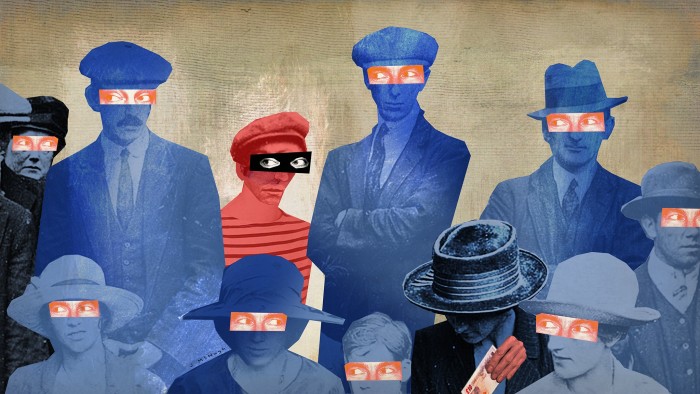Share this @internewscast.com
Unlock the Editor’s Digest for free
Is Britain truly broken? Not exactly. However, there is a growing sense of unease permeating the nation, and it’s not solely due to the rising cost of living. Amidst the disillusionment with British politics, there is a prevailing feeling that, despite paying increasing taxes, citizens are being left to manage on their own.
A recent incident highlights this concern. A friend was shocked to learn that his 24-year-old daughter used an AirTag to locate her stolen laptop, which had ended up in a crack den in east London. When she reported this to the police, they declined to intervene and advised against her going there. Defying the warning, she went to the location herself (without informing her father), confronted the thieves, and miraculously retrieved her laptop unharmed.
Such stories are not uncommon. A neighbor recently identified a notorious local bicycle thief after spotting his own stolen bike abandoned on the roadside and tracking down the person riding it. In response to rising crime, affluent neighborhoods are hiring private security firms. This holiday season, businesses in London’s West End are investing millions in security measures, concerned that thefts and pickpocketing could deter shoppers.
Local services are experiencing a retreat by the state. Financially strained local authorities are allocating increasingly larger portions of their budgets to critical services like special needs education and social care. This shift in spending, favoring a few at the expense of the many, is starting to challenge the social contract, a change keenly felt by taxpayers.
The shortcomings in crime prevention and justice are particularly troubling. Ensuring public safety and delivering prompt justice are essential responsibilities of any government. The level of safety people feel in their communities directly influences their trust in national institutions. Thus, the surge in phone and car part thefts is deeply unsettling, even though knife crime has decreased.
Experts opine that rising voter concern about crime is silly, because violent crime rates are falling. Some even claim that we are all being made paranoid by watching too many TV crime dramas. They miss the point. We humans are hard-wired to pick up the signs of disorder, whether that’s litter, the empty shelves in the chemist, or masked men on souped-up e-bikes. We also notice the response of authorities to what academics call “signal crimes”. Last year, fewer than half of shoplifters were found, and fewer than 1 in 5 are being prosecuted.
A video of the Conservative MP Robert Jenrick confronting a fare dodger went viral partly because it chimed with people’s own experience: fare dodging on London tubes and buses is running at twice the target.
This is not a new challenge. We learnt in the 1990s that “broken windows” matter; that low-level disorder spawns a spiralling sense of impunity. Since Bill Bratton pioneered the Compstat local knowledge system at the NYPD in New York, there’s been intense academic debate about exactly how many of his achievements should be attributed to wider trends across similar societies of falls in crime. But there’s little doubt that criminals will move in to fill a vacuum in enforcement, and that the most effective deterrent against crime is the likelihood of being caught. Active, visible policing of “hotspots” is reliably more effective than politicians blustering about longer sentences.
Over-reliance on the data is a mistake, because it’s so partial. The fact that large numbers of us have stopped bothering to report crime makes a mockery of police recorded crime statistics. Even the annual household Crime Survey for England and Wales, which asks about people’s experience of crime, has such low response rates that at one point its accreditation was temporarily withdrawn. It also doesn’t include crimes against businesses, such as shoplifting, which is at its highest level in 20 years.
Meanwhile, the criminal justice system is in jeopardy, slain by a thousand cuts. The prisons are full — a long-running crisis highlighted by the recent mistakes in early release. The government is planning to remove the ancient right to a jury trial in certain situations. Moreover, the courts backlog means that cases can take years to come to court: this is also proven to reduce the deterrent effect on would-be criminals.
A vicious cycle is under way. Half the public lack trust in the police to tackle local crime, an alarming jump up from 39 per cent in 2019. This in turn makes it harder for officers and staff to do their jobs. The spiral is cemented by the lack of faith which makes two in five people unlikely to report minor offences.
The government has promised to hire extra neighbourhood police and to remove the £200 summary offence threshold for shoplifting, which is sensible. It has announced a collection of small funds for safer streets, each with its own acronym. But the solution isn’t complicated. Taking “low-level” crimes seriously again has already reaped results in Greater Manchester, where police cut burglaries by a third in one year, and in Northamptonshire, where a new focus by police on catching shoplifters has trebled the number of criminal charges brought.
The next election may be fought as much on how safe people feel and their faith in the state, as on the underlying economy. Britain has no shortage of government: of speeches and spending and interference. But if the police won’t show up, you are scared to walk from the pub, and you find you are at the sharp end of court backlogs, politicians are failing in a core duty. The message to my friend’s daughter was: you’re on your own. If we’re not careful, that’s a message that will fray democracy.
camilla.cavendish@ft.com







